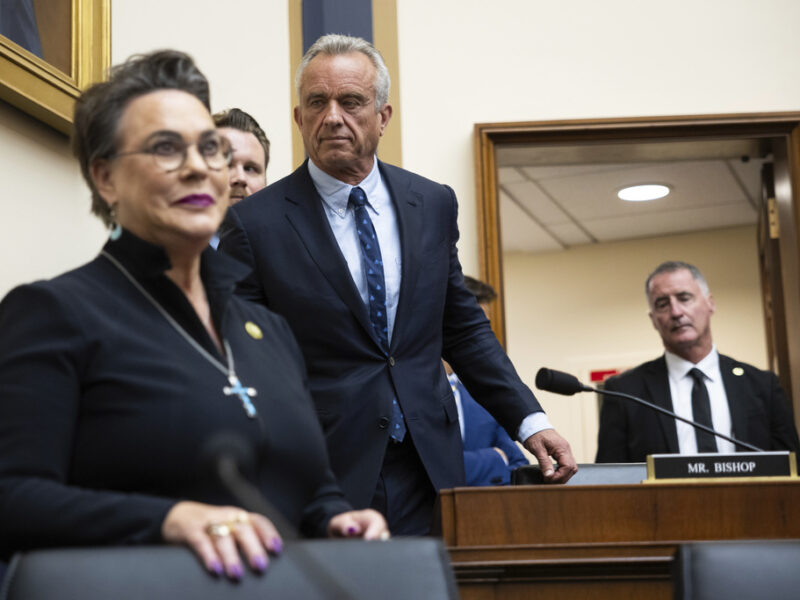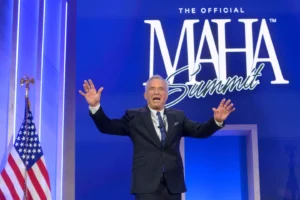At ‘Weaponization’ Hearing on Capitol Hill, Allegations of ‘Censorship’ Abound
Hearing devolved into bickering over witnesses’ past statements
- Published In: Politics
- Last Updated: Jul 21, 2023

Rep. Harriet Hageman (R-Wyo.) participated in a hearing Thursday about alleged censorship of conservatives with Democratic presidential candidate and vaccine skeptic Robert F. Kennedy, Jr. (Francis Chung/POLITICO via AP Images)
By Jacob Gardenswartz
Special to the Wyoming Truth
WASHINGTON — A high-profile hearing on Thursday designed to highlight the alleged censorship of conservative views soon devolved into partisan bickering, as lawmakers clashed over committee rules, witnesses’ past statements and whether the Congress should even be considering the issue in the first place.
Republicans on the House Judiciary Committee’s select subcommittee investigating the “weaponization” of the U.S. government scheduled the hearing in the wake of a decision earlier this month by a federal judge in Louisiana limiting the Biden administration’s ability to contact social media companies about content they find dangerous or misleading. GOP lawmakers, who for years have claimed that the federal government and technology companies were biased against conservative views, celebrated the ruling from Judge Terry Doughty — nominated by former President Donald Trump in 2017 — as a validation of their long-standing concerns.
In his opening remarks, subcommittee chairman and close Trump ally Rep. Jim Jordan (R-Ohio) summed up the GOP conventional wisdom succinctly in claiming that “big tech, big government [are] working together— big media working all together to censor American speech.”
To highlight this point, Jordan and his Republican colleagues invited individuals who claim they have been censored to testify before the committee, including Emma-Jo Morris, a journalist with the far-right news website Breitbart, and Robert F. Kennedy, Jr., a 2024 presidential aspirant, prominent vaccine skeptic and conspiracy theorist.
Yet even before Thursday’s hearing began, Republicans’ messaging was undercut by current events: Doughty’s decision on government contact with social media companies was temporarily halted by a federal appeals court, and Kennedy was caught on camera claiming the COVID-19 vaccine may have been genetically modified to spare Jews and Chinese people — comments widely interpreted as racist and antisemitic.
That Kennedy identifies as a Democrat and is running for the Democratic presidential nomination did little to buttress the critiques members of his own party on the panel levied against him.
“It’s a free country, you absolutely have a right to say what you believe,” said Rep. Stacey Plaskett (D-Virgin Islands), the top Democrat on the subcommittee. “But you don’t have the right to a platform, public or private. We don’t have to give one of the largest platforms of our democracy, Congress, this hearing. Our right does not mean that we, as Americans, are not free from accountability.”
In the days leading up to the hearing, over 100 Democratic lawmakers signed onto a letter to Jordan and House Speaker Kevin McCarthy (R-Calif.) calling for Kennedy to be disinvited, though the two resisted such efforts. One of the letter’s organizers, Rep. Debbie Wasserman Schultz (D-Fla.), who is Jewish, tried to force the committee into executive session during the hearing — claiming Kennedy violated rules of decorum by espousing “despicable antisemitic and anti-Asian comments.” Republicans ultimately voted down her measure 10–8, claiming it amounted to “censoring” Kennedy yet again.
Kennedy, for his part, repeatedly denied holding any racist or antisemitic views. “I don’t believe there’s a single person who signed this letter who believes I’m antisemitic,” he attested. He similarly suggested he’s “never been anti-vax” — though he has in the past alleged vaccine research was responsible for HIV spread, suggested those who promote vaccine uptake should be subjected to “corporate death penalty” and compared those opposing vaccine mandates to Jews fleeing Nazi Germany.
During the hearing, Rep. Harriet Hageman (R-Wyo.) chose not to focus her questioning on the controversial Democratic figure but instead on Morris, who authored a New York Post report in late 2020 concerning a laptop belonging to Hunter Biden, the president’s son. Morris claims she was censored by Twitter and Facebook, each of which temporarily directed traffic away from the story due to company policies against promoting potentially hacked material.
Attesting to the importance of an independent and free press, Hageman questioned how many people might not have read the story due to the company’s actions. She went on to claim that “the American public were not told the truth about the Hunter Biden laptop and Joe Biden’s involvement with his foreign dealings.”
“They’re not stopping,” Hageman added of the Biden administration. “They’re going to continue to try to further the censorship industrial complex as long as they can, and will continue to attempt to violate our First Amendment rights.”













